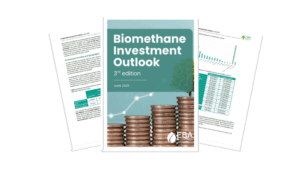European biomethane hits 7 bcm but growth slows, reveals EBA study

However, the pace of growth is beginning to falter despite robust investor confidence, highlighting the need for stronger policy direction and regulatory support, according to the European Biogas Association (EBA).
The latest Biomethane Investment Outlook 2025, published today (26 June), reveals that investment in the sector has risen to €28 billion – up €1 billion from last year.
This financial commitment is expected to deliver 7.3 bcm of biomethane capacity by 2030, slightly above the previous projection.
Nonetheless, the modest growth indicates a slowdown that could jeopardise long-term targets without decisive policy action.
The accompanying European Biomethane Map 2025 shows a steady increase in the number of operational biomethane plants across Europe, from 1,548 in 2024 to 1,678 in 2025.
A total of 165 new facilities came online in this period, with 56 launching operations in early 2025 alone.
France has now overtaken Germany as the leading biomethane producer in Europe, with a 21% higher production share and three times as many plants.
Meanwhile, Germany and the UK have seen growth stall, largely due to regulatory uncertainty.
Italy, the Netherlands, Denmark, and Sweden remain major players, though their year-on-year progress has been comparatively slower.
Plant size varies significantly across the continent. While France leads in plant numbers, its facilities average just 251 Nm³/h. Italy and Germany, on the other hand, boast larger-scale operations averaging 727 Nm³/h and 605 Nm³/h respectively. Denmark stands out with a much higher average capacity of 1,468 Nm³/h, despite a lower number of installations.
More than 85% of European biomethane plants are now grid-connected, with 47% linked to distribution networks and 8% serving transport infrastructure.
Commenting on the sector’s outlook, EBA CEO Harmen Dekker said: “Three years ago, the REPowerEU plan set an ambitious target of 35 bcm of biomethane by 2030, which gave a strong signal to investors and policymakers alike. Yet despite the vast potential – including 150 bcm of biogases, 177 million tonnes of organic fertilisers, and 120 million tonnes of biogenic CO₂ by 2050 – progress is too slow.
"Clear political support, binding targets, and legal certainty are essential if we are to realise the full potential of biogases as a secure, sustainable, and competitive energy source for Europe.”
Industry leaders are now calling for the swift adoption of a 2040 roadmap for biogases, featuring enforceable targets and robust regulatory frameworks to match investor enthusiasm with long-term certainty and policy alignment.















